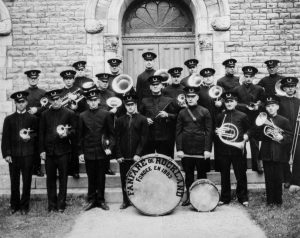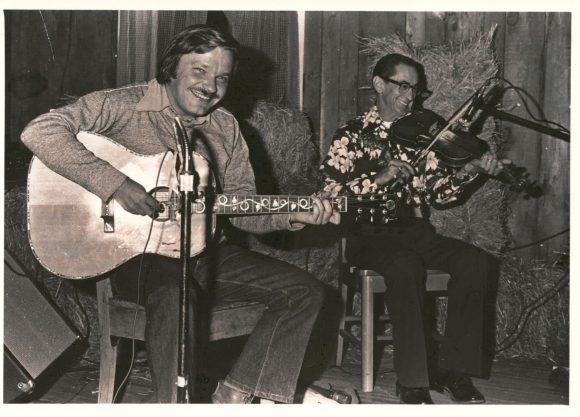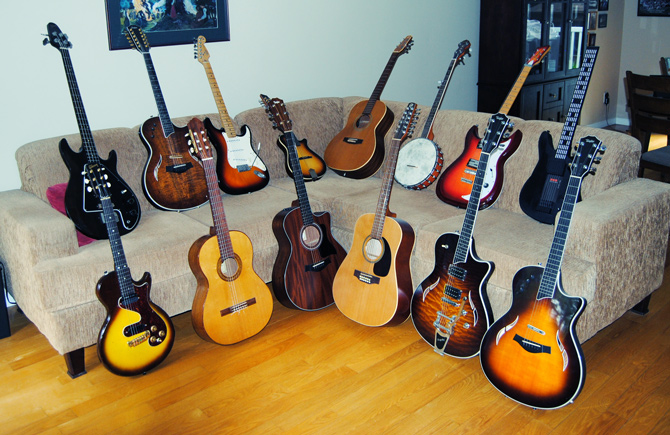The old-time fiddle tune “Sail Away Ladies” was included in Harry Smith’s ground-breaking 1952 six-album compilation entitled Anthology of American Folk Music, which was instrumental in the rise of the American Folk Revival in the 1950s and 1960s. Although “Sail Away Ladies” was originally recorded in 1926 by John L. “Uncle Bunt” Stevens (1879-1951), the piece has its origins in the British Isles of the 18th century. Uncle Bunt’s magnificent playing, with its echoes of Cajun fiddle music, summons up the sound of folk activities from a long gone era, tasks like husking bees, barn raisings, quilting parties and entertainment like barn dances. It is, to me, one of the very best recordings of the first half of the 20th century.
John Stephens was a farmer for most of his life. He rapidly rose to fame in 1926 when he placed in regional fiddle competitions and then won the title of World Champion Fiddler, besting 1,876 other fiddlers in automobile magnate Henry Ford’s series of contests. The competitions were held at Ford dealerships through the East and Midwest and winners of the local contests were brought to Detroit to play in the championship round. Stephens’ prize was said to be $1,000, a new suit, a new car, and a new set of teeth. After recording four 78 RPM sides for Columbia Records and making a short tour with some appearances on the Grand Ole Opry stage, Uncle Bunt retired from public life and returned to his farm in Bedford County, Tennessee.
The lyrics to the song come from a 1927 recording by Uncle Dave Macon. Ever the entertainer, Uncle Dave’s lyrics are essentially nonsense and good-natured fun. I’ve chosen to incorporate lyrics from African-American versions of the song into mine. For more on Uncle Dave Macon and his music, click here.
Although “Sail Away Ladies” was recorded hundreds of times by hundreds of artists, almost all available versions are identical. The notable exception is a 1957 recording by Odetta (Holmes,1930-2008), a wonderful laid-back folk/blues interpretation. I based my version of the song exclusively on the recordings of Uncle Bunt and Odetta. I also chose to use my new mandolin exclusively on this piece. After all, mandolins and fiddles are identically tuned.
After many, many auditions of Uncle Bunt’s and Odetta’s recordings, absorbing the essence of “Sail Away Ladies”, I proceeded with test recordings of the song the way it came to me. I was very surprised when my recording featured a Bo Diddley beat! Mixing Bo Diddley (Ellas McDaniel, 1928-2008) into an old-time fiddle tune might be sacrilegious but I’ve always loved Bo so I liked the result. Then, last December 31, I found that New Year’s Eve was the birthday of Bo Diddley … and Odetta ! I igured it was a sign or some kind of cosmic endorsement, so I went ahead with my version. For more information on Bo Diddley and his music, click here.
The most natural, unsophisticated musician I’ve ever known was Alcide Dupuis (1928-2008), a fiddler from Rockland. Yes, I also noticed that Alcide’s birth and death years are identical to those of Bo Diddley, as if I needed a further endorsement ! Alcide was a small imp of a man who learned to play from an uncle but he only knew where to place his fingers on the neck of the fiddle and how to move the bow to get the sounds he wanted. Alcide didn’t know chords, keys, notes, nor song titles. His repertoire included many jigs, reels and cotillions which changed keys in midstream, making it impossible for any other local guitarists he knew to follow him. When I started playing with Alcide, I had a good ear and a fair knowledge of music structure so I was able to follow him when he changed keys. The first time this happened, Alcide was astonished – for the first time, he was hearing his tunes as they were meant to be played. He was so happy to have found someone he could play with. We formed a good friendship and we started playing together, mostly for beers in the tavern of the King George Hotel in Rockland.
When my recording career took off, I was asked to play at an autumn festival held simultaneously at La Ferme Denis and the Plantagenet High School. I invited Alcide to join me and I also gave him half of the generous stipend I received for performing. For Alcide, this was the big time ! He had never been paid to play music in his life before. He showed up in a fabulous black silk shirt with a colourful flower motif, trousers with a crease that would have cut steel, shoes polished and hair slicked back! As you can tell from the photo, we had a great time. I don’t think I’ve ever seen two happier men. The guitar I’m playing was made for me in 1976 by Marc Beneteau, a luthier, good friend and guitarist who played with me for a number of years, in concert and on my recordings.
Seeing Alcide initiate a song was like nothing else in this world. Songs were stored in his memory but he couldn’t identify them by title, key or any other method so he scratched at his fiddle until the notes led him to the song. He would find the path, gradually connecting the dots until the melody he wanted emerged. Then, Alcide would take off like a Boeing 747, driving the song out with complete joy, his feet stepping complicated rhythms in time with the music (he was a terrific stepper). Alcide Dupuis was a veritable force of nature. He was transformed when he played, his face twisting in a grin of pure joy. It was the most fun I’ve ever had playing music and I’d like to dedicate my version of “Sail Away Ladies” to Alcide’s memory.
Richard Séguin – voice, mandolin, percussion


